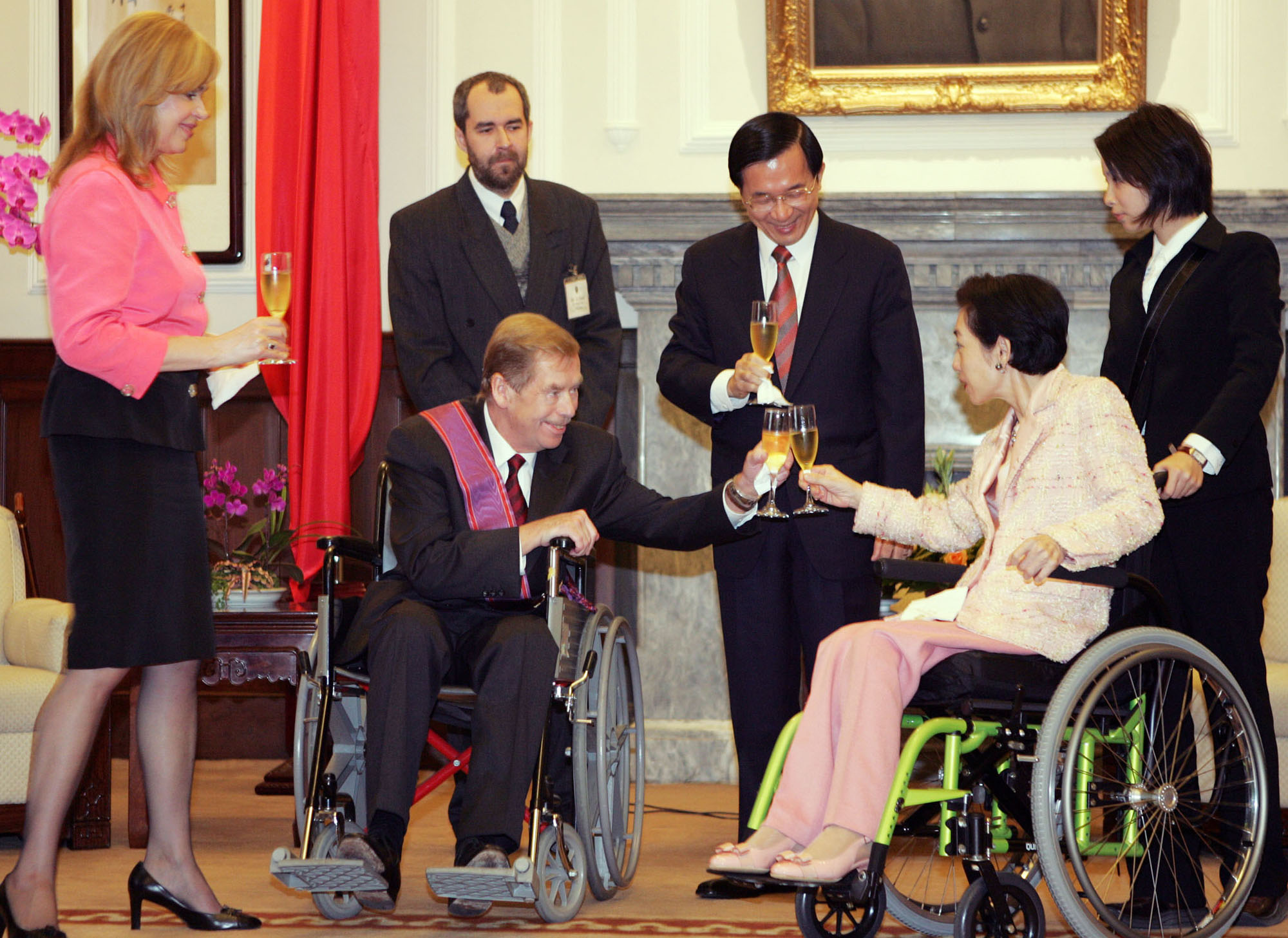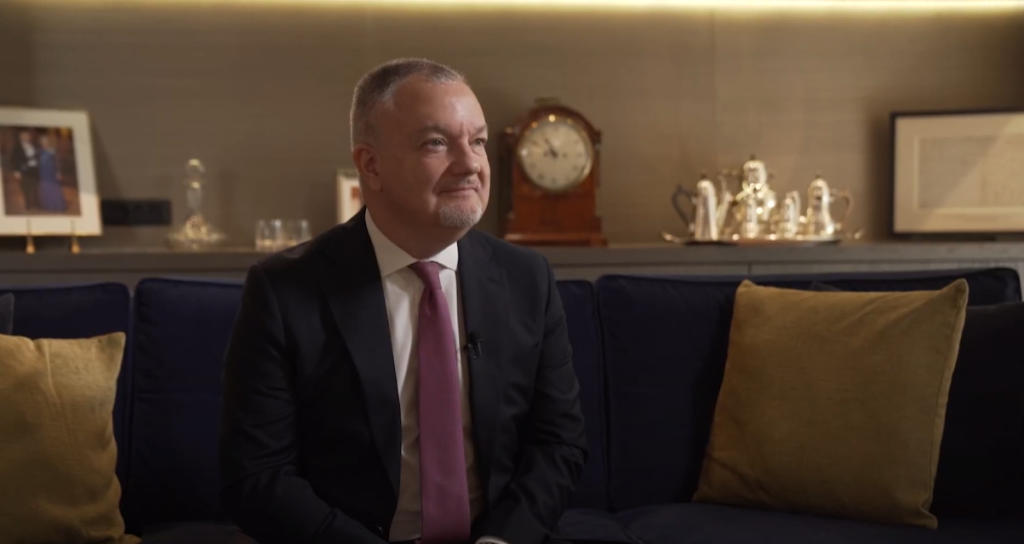TAIPEI—In an era of brutal great-power politics, how do lesser powers get by? For this embattled Pacific island, a lifeline comes from landlocked Slavs half a world away.
Taiwan and the Czech Republic, living in the shadow of China and Russia, have found common cause when small powers worry about being trampled by bigger rivals. Of roughly 200 countries and independent territories on Earth, fewer than 10 have significant global sway.
The issue is gaining fresh urgency as U.S. foreign policy under President Trump becomes antagonistic. Many in Taipei see deteriorating U.S.-Ukraine ties as a warning about Washington’s willingness to defend Taiwan in case China—which regards the self-governed island as its own territory—invades.
Denmark, pressed by Trump to sell Greenland , is seeking support from European and other allies. Colombia acquiesced to Trump’s tariff threats and agreed to accept U.S. deportees. The Philippines and other Asian countries worry the U.S. will diminish support in standing up to China.
“It’s about how small countries survive,” said Jakub Janda, a Czech international-security specialist who runs the first European think tank in Taiwan, the Prague-based European Values Center for Security Policy.
Diplomats and business people say the Prague-Taipei friendship—which involves cooperation in intelligence, trade and investment—helps both sides.
For Taiwan, which Beijing works to isolate internationally, Czechs offer a welcome link to the world—even though the two don’t have formal diplomatic relations. The Czech Republic, a member of the European Union and the North Atlantic Treaty Organization, takes more initiative on Taipei’s behalf than other EU members, particularly in building business ties, say officials.
Czechs are channeling Taiwanese humanitarian aid to Ukraine in its fight against Russia because Kyiv and Taipei don’t have diplomatic relations. Czechs are Taiwan’s most ardent advocates inside NATO, say diplomats. NATO is building links to Asia-Pacific allies including Japan and South Korea amid fears of China’s malign activities in and near Europe, but is hesitant with Taiwan.
“Every time we need support, the Czech Republic is always there to support us,” said Joseph Wu , the head of Taiwan’s National Security Council and former foreign minister, on a visit to Prague.
Taiwan’s experience facing China, meanwhile, is valuable to Prague and its neighbors.
“Every NATO country near Russia wants to talk with us,” said Taiwan’s Deputy Minister for Digital Affairs Chiueh Herming, who oversees cybersecurity, connectivity and digital resilience. He last year attended a conference in Prague on protecting undersea internet cables. Taiwan and Europe since 2023 have faced repeated ruptures in those connections, many of which they suspect were Chinese and Russian sabotage.
Czech Cyber and Information Security Agency Director Lukas Kintr said his team has shared with Chiueh’s ministry extensive information on Russia’s influence campaigns in Europe, which China is studying. “We can learn from Taiwan about China too,” he said.
Czechs know they will never be Taiwan’s top commercial partner because the country of 11 million people lacks economic heft. Some Czechs were disappointed when Taiwanese semiconductor giant TSMC in 2023 announced plans for a $10 billion factory in Dresden, Germany.
But the Czech Republic, 30 miles from Dresden, still benefits. TSMC sees it as a vital part of the plant’s supply chain and the Taiwanese government is working with TSMC suppliers to start Czech operations and business clusters, government officials say.
Nonstop flights to Prague that Taiwan’s China Airlines launched in 2023 are among its most successful, say officials in Taipei, and the carrier wants to increase frequency.
Beijing has worked to cleave the duo and attacked their partnership but holds little leverage: China accounts for less than 2% of Czech exports. Still, Prague treads cautiously.
“We know the Chinese are interested in Taiwanese activities here,” said Czech Counterintelligence Agency Director Michal Koudelka.
Under communism, Prague professed socialist kinship with the People’s Republic of China, not Taiwan. When the Warsaw Pact collapsed in 1989 and Czech dissident playwright Vaclav Havel was elected president, he advocated morality in international relations. The call resonated amid democracy’s apparent triumph over Moscow’s totalitarianism and as Beijing’s crackdown in Tiananmen Square that year drew global condemnation.
Havel quickly became a very public friend of the Dalai Lama, whom China in 1959 had exiled from his native Tibet. The two men together preached peace, drawing Beijing’s ire. Czech ties to the Dalai Lama would repeatedly infuriate China over subsequent decades.
When Taiwan in the early 1990s shed its military-backed autocracy, Havel and the Czech transition became a model for President Lee Teng-hui, who led Taiwan’s shift to democracy. After Havel’s presidency ended in 2003 he visited Lee, further angering China.
Thanks in part to Havel’s support, Taiwanese tech companies picked the Czech Republic as a European base, even before it joined the EU in 2004. Foxconn , which makes iPhones for Apple , and computer makers Acer and Asus were the biggest names in a wave of investments.
But the global financial crisis and China’s economic ascendance “made people start doubting their assumptions” about Western capitalism and Czech-Tawainese ties, recalled Martin Hala, director of Sinopsis, a China-focused think tank in Prague.
In Central Europe, China started building highways and rail lines on apparently favorable terms. EU officials worried that Beijing was wooing its newest and poorest members.
Czechs in 2013 elected a China-friendly president, Milos Zeman, who in 2016 advocated a “restart” of relations with Beijing and hosted Chinese leader Xi Jinping in Prague. Taiwan-China relations separately blossomed.
Then, in a stunning twist, China in 2018 arrested its biggest investor in the Czech Republic for fraud, leaving many Czech partners burned.
Prague’s newly elected mayor, meanwhile, infuriated Beijing by embracing Taiwan, where he once lived. China’s reprisals included rescinding a promise to send pandas to the city’s zoo. Taipei offered Prague a pair of endangered pangolins instead.
“The Czech case with China is a textbook example of what can go wrong,” said Hala.
As Czech opinions of China soured further during the Covid-19 pandemic, opposition legislators rekindled Taiwan ties . In 2020 Czech Senate President Milos Vystrcil flew to Taipei and, addressing the island’s lawmakers, cited President John F. Kennedy’s 1963 Berlin speech and declared in Mandarin Chinese, “I am Taiwanese.”
China’s Foreign Minister Wang Yi at the time called Vystrcil’s trip a “public affront” that “crossed a red line” for which he would “pay a heavy price.”
Lithuania showed the risk of closeness to Taiwan in 2021, when the former Soviet vassal let Taipei open a “Taiwanese Representative Office.” Beijing considered the name tantamount to recognizing Taiwan as a sovereign country, which it vehemently opposes. Lithuania accused China of retaliating by discriminating against its exports. Vilnius prodded the EU to open a case against Beijing in the World Trade Organization.
In 2023, one of the first moves of newly elected Czech President Petr Pavel , a retired senior NATO general, was taking a call from Taiwan’s president, drawing condemnation from Beijing.
The Czechs soon after sent their largest trade delegation yet to Taiwan, led by the parliament’s speaker. Also on the trip was cyber agency chief Kintr, to deepen ties with his counterparts.
The Taiwanese and Czech military universities separately struck a partnership to conduct joint research and exchange officers for training, among other activities, creating Taiwan’s strongest link with a European military training institution.
Now, with political pressure mounting in both Taiwan and the Czech Republic, the two need to demonstrate that their relations can deliver more, say analysts. High-tech investment doesn’t benefit the large Czech agricultural sector, which wants more exports, said Marcin Jerzewski, who runs the European Values Center’s Taipei office.
“Havel quotes don’t put bread on the table,” said Jerzewski.
Czechs, meanwhile, have struggled to broaden Taiwan ties to other European countries, which remain wary of angering China.
On one front the relationship has yielded unexpected results: Prague’s pangolins from Taipei have had two babies, a rarity in captivity, drawing cheers in both capitals.
Write to Daniel Michaels at Dan.Michaels@wsj.com



